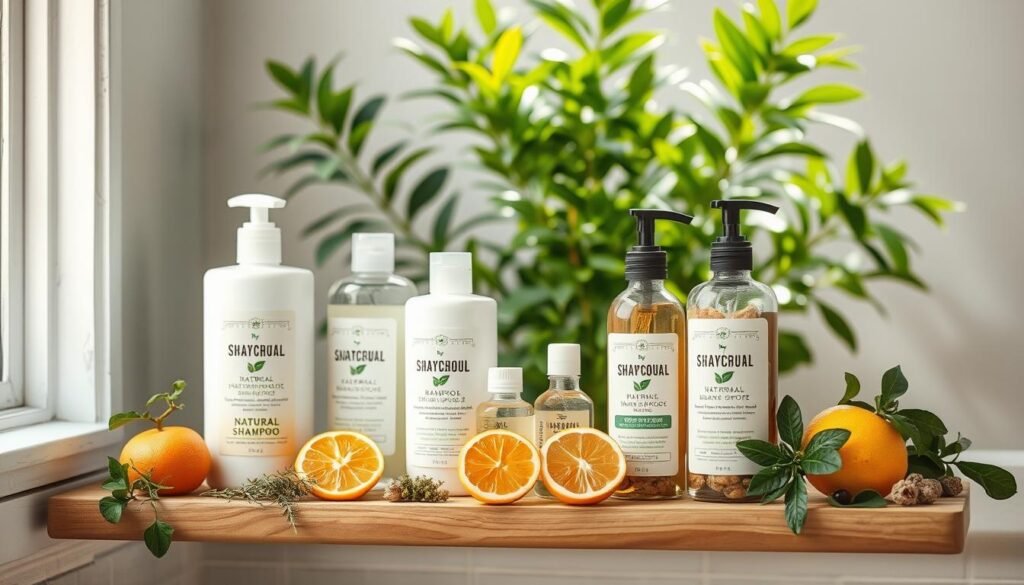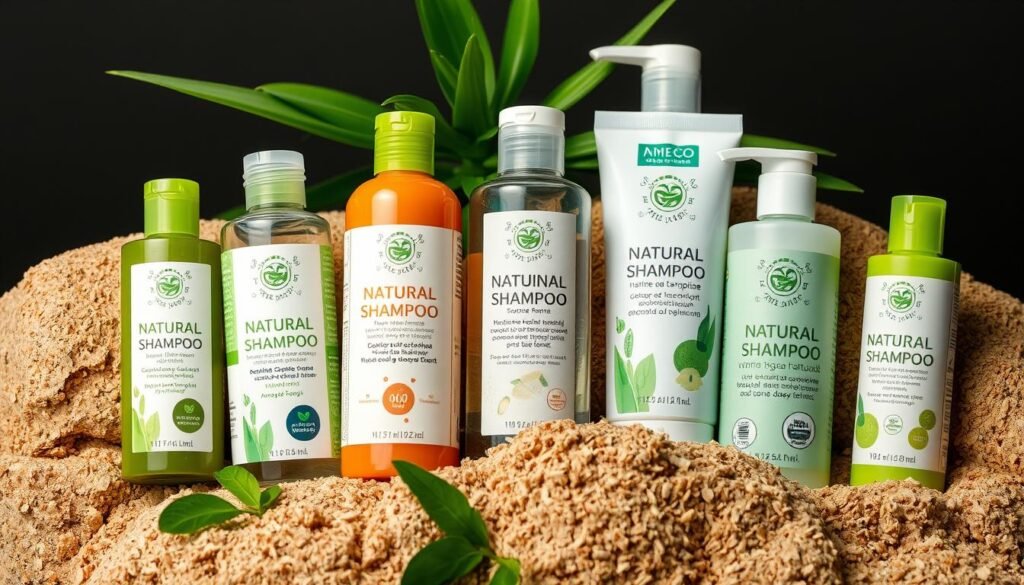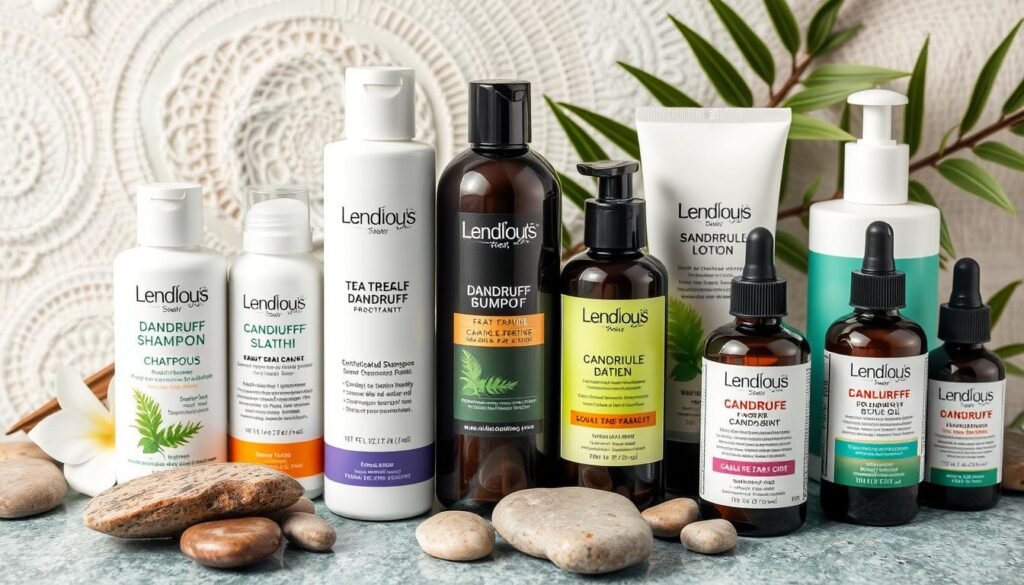Did you know no natural remedy can really fix dandruff? Natural shampoos and DIY hair care are popular but might not help much. People often use coconut oil and lemon juice hoping for relief. However, these don’t work well against dandruff’s main cause, Malassezia globosa.
Natural shampoos might not be the best dandruff solution. For example, Head & Shoulders targets Malassezia globosa directly and works better than home remedies. It’s important to understand why dandruff happens and why natural methods aren’t as good. Knowing about proper dandruff treatments can help us take better care of our scalp.
Key Takeaways
- No natural remedy has been clinically proven to treat dandruff effectively.
- Active ingredients in Head & Shoulders outperform common DIY solutions.
- Popular natural ingredients show no benefits in preventing Malassezia globosa.
- Understanding dandruff causes is crucial for effective treatment.
- Commercial dandruff treatments are formulated for scalp health and efficacy.
- Exploring scientifically-backed options can improve dandruff management.
Understanding Dandruff and Its Causes
Dandruff shows up as flaking skin on the scalp, often with irritation and itchiness. To find out why it happens, we need to look at common triggers. We also need to know about organisms like Malassezia yeast that play a part in causing dandruff.
Common Triggers of Dandruff
Dandruff can happen for many reasons. Let’s explore some common triggers:
- Oily skin: Too much oil can help fungi grow.
- Hair care routines: Using the wrong products can irritate your scalp or build up products.
- Medical conditions: Issues like seborrheic dermatitis are more common in adults, especially men. These conditions can lead to dandruff.
- Environmental factors: Being outside often can help keep your scalp healthy by reducing oil.
- Stress: High stress can make dandruff worse, so managing stress is key.
The Role of Malassezia Yeast
Malassezia yeast is important in understanding dandruff. This fungus loves the oils on our scalp. If its balance is upset, it can grow too much. This overgrowth can cause inflammation, leading to itching and flaking. Oily skin and health conditions can make this worse.
The Limitations of Natural Shampoos
Many people try natural shampoos and DIY solutions to get rid of dandruff. However, these products often don’t deliver the expected results. Knowing their limits helps in choosing the right care for your scalp.
Why DIY Remedies Often Fail
Popular DIY remedies like coconut oil and lemon juice aren’t very effective against dandruff. Research shows these aren’t good at stopping the growth of Malassezia, which mainly causes dandruff. People using these might miss out on the benefits of proven treatments found in store-bought shampoos. So, they might still face scalp problems.
Natural Ingredients and Their Efficacy
Natural ingredients sound appealing, but they don’t always work against dandruff. Some, even with anti-fungal properties, fail to tackle dandruff’s root causes. For example, aloe vera and tea tree oil have benefits but may not fully manage dandruff. On the other hand, products like Dandruff Cleansing Shampoo with Argan show better results by targeting specific issues.

Those dealing with dandruff should consider exploring commercial anti-dandruff treatments. Realizing that natural shampoos might not fix dandruff can help in finding more effective solutions. This approach can lead to healthier hair and scalp.
Natural Shampoos May Not Solve Your Dandruff Problem
Natural shampoos are popular but might not fix dandruff issues. People often turn to them, hoping for a quick fix. But, the truth is they don’t have strong scientific support. Around half of all people will experience dandruff at some point.
While natural ingredients like coconut oil or aloe vera can offer mild relief, they often don’t address the main reasons for dandruff. This is especially true for fungal problems on the scalp. For example, coconut oil was seen to help scalp health for some people after 16 weeks. Yet, using these remedies alone might not fully solve the problem.
Ignoring the real causes of dandruff can make things worse. Stress-related conditions, like seborrheic dermatitis, affect about 28% of those with dandruff. Scientific treatments often work better. Things like improving your diet or taking probiotics have been shown to help. But, these methods work best when used together.
Some people try natural remedies for hair care. But it’s important to know what really works. Look into treatments that have been proven effective for dandruff. Only using natural shampoos might not give the desired results.

Clinically Proven Dandruff Treatments
There are many great dandruff treatments available. They have key ingredients that fight the causes of dandruff. This helps improve the health of your scalp.
Active Ingredients in Commercial Shampoos
Medicated shampoos designed for dandruff have strong active ingredients. Here are a few key ones:
- Pyrithione zinc – It has anti-fungal properties that target the yeast causing dandruff.
- Ketoconazole – This is a strong anti-fungal that helps with severe dandruff cases.
- Selenium sulfide – It cuts down on flakiness by reducing oil on your scalp.
- Salicylic acid – This helps remove dead skin, preventing flakes.
- Tar-based shampoos – They slow down skin cell turnover to combat tough dandruff.
How Dandruff Shampoos Work
Dandruff shampoos target Malassezia yeast on the scalp to reduce dandruff. Their anti-fungal actions help lower yeast levels. You should use them two to three times each week for the best results.
If you have dry hair, use moisturizing conditioners and don’t shampoo too often. If light dandruff stays, consider stronger prescription shampoos or lotions.

Comparing Natural and Synthetic Hair Care Products
The face-off between synthetic and natural hair shampoos often boils down to their impact and safety. Synthetic shampoos, appearing in the 1930s, rely on man-made surfactants and chemicals for strong cleansing. In contrast, natural shampoos use mild ingredients to improve hair health without harmful chemicals.
Benefits of Synthetic Shampoos
Synthetic shampoos contain powerful cleaning agents like sodium lauryl sulfate (SLS) and ammonium lauryl sulfate (ALS). These ingredients are great at removing dirt and oil, especially for those with oily scalp or dandruff. However, their strong chemicals can leave hair dry and lifeless with overuse. Still, many prefer them for a thorough wash.
Risks of Chemical Additives
While synthetic shampoos offer quick results, they carry risks from chemical additives. They often have silicones, such as dimethicone and cetyl dimethicone, which can trap dirt and weaken hair over time. Choosing hair products wisely is crucial for long-term scalp health. For a gentle clean, Human Nature shampoos offer natural alternatives without these downsides.
The choice between synthetic and natural shampoos involves weighing their pros and cons. It’s important to consider what your hair needs to find the right product for you.
| Feature | Synthetic Shampoos | Natural Alternatives |
|---|---|---|
| Cleansing Power | High due to strong surfactants | Moderate; relies on gentle surfactants |
| Chemical Additives | Includes sulfates and silicones | Focuses on plant-derived ingredients |
| Long-Term Hair Health | May lead to dryness and damage | Promotes nourishment and moisture retention |
| Environmental Impact | Varies based on formulation | Often eco-friendly with minimal impact |
| Availability | Widely available in stores | Available through brands like Human Nature and various online channels |
More and more people are choosing their hair care products with care, keeping ingredient quality in mind. For issues like dandruff, natural treatments might be the perfect addition to your hair care routine.
Scalp Health and Its Impact on Dandruff
Understanding how scalp health affects dandruff is key. A healthy scalp stops too much Malassezia yeast from growing. This yeast leads to dandruff and seborrheic dermatitis. With the right care, you can lower the risk of these issues.
The Importance of a Healthy Scalp Environment
A cared-for scalp keeps skin flora in balance. Cleaning and softly scrubbing away old skin prevents build-up. This stops irritation and the skin flaking off. Keeping a clean scalp, by picking the right shampoo and how often to wash, is vital. For some, washing hair daily works best, while others might do it weekly. This keeps oil and dead skin under control.
Managing Conditions Like Seborrheic Dermatitis
Seborrheic dermatitis can affect the scalp and other oily areas. To manage it, combine lifestyle changes with specific treatments. Products with ketoconazole and zinc pyrithione can help. For those struggling with dandruff, managing stress through meditation and exercise is beneficial for a healthy scalp.
For extra details, check out this study on dandruff and seborrheic dermatitis.
Dermatologist Recommendations for Dandruff Control
Dealing with persistent dandruff can be both frustrating and embarrassing. Turning to dermatologist recommendations gives you special advice for your case. A dermatologist checks the scalp, finds out why you have dandruff, and suggests personal solutions. These might work better than what you find in stores.
Consulting a Dermatologist
Seeing a dermatologist is key for tough dandruff cases. They know how to prescribe strong prescription treatments. These treatments tackle deep-rooted issues like fungal infections or skin conditions. This expert advice doesn’t just help with dandruff control. It also stops your scalp from getting worse.
Common Prescription Treatments
Dermatologists might suggest different prescription treatments depending on what you need. These can include:
| Product | Active Ingredient | Indication |
|---|---|---|
| Neutrogena T/Gel Therapeutic Shampoo | Coal Tar Extract | Effective against dandruff and scalp psoriasis |
| DHS Zinc Shampoo | Pyrithione Zinc | Calms irritated and inflamed skin |
| Head & Shoulders Clinical Strength | Selenium Sulfide | Targets seborrheic dermatitis |
| Aveda Scalp Remedy™ | Salicylic Acid | Exfoliates and soothes the scalp |
For extra details on effective treatments, you can visit this link. It’s a great extra resource alongside a doctor’s advice. It offers more insights into beating dandruff for good.
Holistic Approaches to Dandruff Management
Managing dandruff goes beyond just shampoos and treatments. It’s about understanding what your body needs. This means looking at your diet and emotional health. Let’s explore how these factors can help control dandruff.
Diet and Dandruff Connection
The food you eat plays a big role in fighting dandruff. Your scalp loves nutrients like omega-3 fatty acids, zinc, and vitamins. People with seborrheic dermatitis, a kind of dandruff, often need more riboflavin, niacin, and pyridoxine.
Eating a lot of processed food has been linked to more dandruff. On the other hand, fruits can help reduce it. Adding probiotics to your diet can improve your gut health. This helps lower inflammation and dandruff. A balanced diet keeps your scalp’s oil in check and fights off Malassezia, a dandruff-causing yeast.
Stress Management Techniques
Stress is a big trigger for dandruff. Using meditation, yoga, and exercise can lower stress. These practices keep you feeling good and help your scalp stay healthy. Stress weakens your defense against Malassezia.
Simple things like caring for yourself, drinking enough water, and scalp massages are key. They help you relax and improve treatment results. By focusing on your diet and managing stress, you can create a full plan for a healthy scalp.
Conclusion
Many people try natural shampoos to fight dandruff but often find they’re not enough. Without the necessary active ingredients, these shampoos don’t solve the problem. That leads to disappointment and the search for other solutions.
Clinically tested treatments with pyrithione zinc or ketoconazole are more effective. They have proven success in beating dandruff. So, they are a better choice for those looking for dependable outcomes.
To keep a healthy scalp, it’s important to not wash your hair too often. Trying different products can also help find the right one for your scalp. Talking to a dermatologist is important too. They can give advice and prescribe treatments for severe conditions like seborrheic dermatitis.
Getting rid of dandruff involves expert advice, the right products, and sometimes natural remedies. Using things like apple cider vinegar or aloe vera can help. This way, you can move towards a healthier scalp and feel more confident about your hair care.